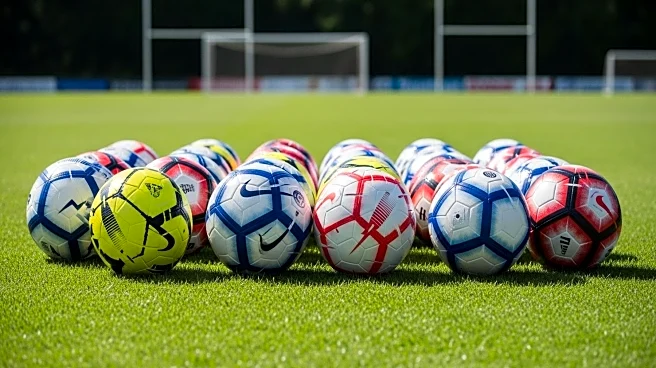What's Happening?
Football clubs in Essex have witnessed a significant increase in the number of girls participating in the sport, attributed to the success of England's Lionesses in the Euro 2022 tournament. Witham Town FC and Thundersley Rovers, which had no girls' teams in 2022, now boast 15 teams between them. The Essex Football Association reports a 41% rise in registered girls' teams since 2023. Coaches like Colin Smith and Steve Pudney have noted the enthusiasm and commitment of the girls, who train in all weather conditions. The Michael Richardson Football Academy has also seen a dramatic increase in female participation, growing from 10 to 120 girls in its programs.
Why It's Important?
The surge in girls' participation in football reflects a broader cultural shift towards gender equality in sports. This development not only provides more opportunities for young girls to engage in physical activity but also challenges traditional gender roles. The increased interest in women's football could lead to more investment in female sports programs and facilities, potentially inspiring a new generation of female athletes. This trend also highlights the impact of role models, as young players are inspired by the determination and success of figures like Lucy Bronze and Hannah Hampton.
What's Next?
As interest in girls' football continues to grow, clubs and associations may need to expand their facilities and resources to accommodate the increasing number of participants. This could involve hiring more coaches, organizing more competitions, and securing additional funding. The success of the Lionesses may also encourage other regions to develop similar programs, further promoting women's football across the country. Additionally, the increased visibility of women's sports could lead to more media coverage and sponsorship opportunities, further elevating the profile of female athletes.
Beyond the Headlines
The rise in girls' football participation may have long-term implications for societal attitudes towards women in sports. As more girls engage in football, it could lead to greater acceptance and normalization of women in traditionally male-dominated sports. This shift could also influence other areas of society, promoting gender equality and challenging stereotypes. Furthermore, the success of grassroots programs could serve as a model for other sports looking to increase female participation, potentially leading to a more inclusive sporting environment overall.










